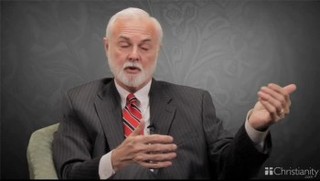
Change Translation
- Recent Translations
- All Translations
Videos for Matthew 3:9

Matthew 3:9 Meaning and Commentary
And think not to say within yourselves
John knew the sentiments of their minds, and the prevailing opinion they had given into, against which he cautions them; as, that because they were Abraham's seed, they were in a state of salvation, in the favour of God, and had a right to all privileges and ordinances: this they trusted in, and boasted of, and would often think of it within themselves, pleasing themselves with the thoughts of it, and speak of it to others;
we have Abraham for our father.
The Baptist was aware how ready they would be to object this to him; and therefore prevents their plea from hence in favour of their admission to baptism, by assuring them, that this would have no weight with him, nor give them any right to the ordinance he administered: hence it appears that it is not a person's being born of believing parents that can entitle him to water baptism; or be a reason why it ought to be administered to him: if nothing more than this can be said in his favour, it is a plain case from hence, he ought to be debarred from it. The reason John gives why such a plea as this would be insufficient is,
for I say unto you;
I assure you of it; you may depend on it as a certain truth,
that God is able of these stones to raise up children unto Abraham.
To "raise up children" is an Hebrew way of speaking, and the same with (Mv) or (erz Myqhl) to "raise up seed", or a "name" to another, ( Genesis 38:8 ) ( Deuteronomy 25:7 ) ( Ruth 4:10 ) and signifies to beget children for another, who are to be called by his name. Some by "the stones" understand the Gentiles, comparable to stones, both for the hardness of their hearts, and their idolatry in worshipping stocks and stones; of and among whom God was able to raise, and has raised up, a spiritual seed to Abraham; who are of the same faith with him, who walk in his steps, and whose father he is: but then it must be supposed, according to this sense, that there were some Gentiles present, since John calls them "these" stones, pointing to some persons or things, that were before him; wherefore I rather think that this phrase is to be taken literally, and that John pointed to some certain stones that were near him, within sight, and which lay upon the banks of Jordan, where he was baptizing; for what is it that the omnipotent God cannot do? He could as easily of stones make men, as make Adam out of the dust of the earth, and then make these men, in a spiritual sense, children of Abraham; that is, believers in Christ, and partakers of his "grace; for if ye be Christ's, then are ye Abraham's seed, and heirs according to the promise", ( Galatians 3:29 ) . So that God stood in no need of these persons, nor had they any reason to boast of their natural descent from Abraham; since this in spiritual matters, and in things relating to the Gospel dispensation, would stand them in no stead, or be of any advantage to them.
Matthew 3:9 In-Context
Study Tools
PLUSUnlock Notes
This feature is for PLUS subscribers only. Join PLUS today to access these tools and more.
JOIN PLUSUnlock Highlights
This feature is for PLUS subscribers only. Join PLUS today to access these tools and more.
JOIN PLUSUnlock Bookmarks
This feature is for PLUS subscribers only. Join PLUS today to access these tools and more.
JOIN PLUSTrack Your Reading
Create a free account to start a reading plan, or join PLUS to unlock our full suite of premium study tools.